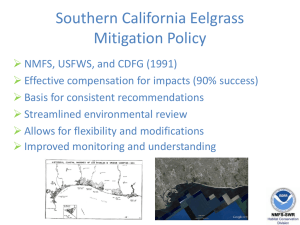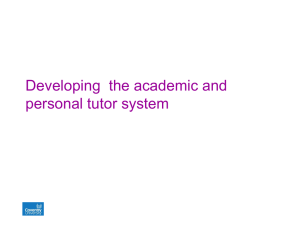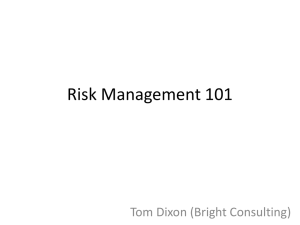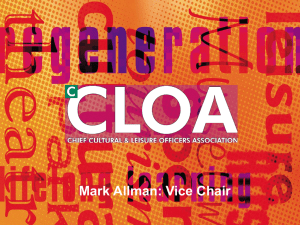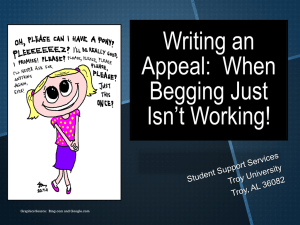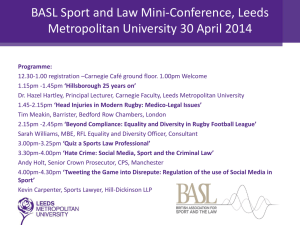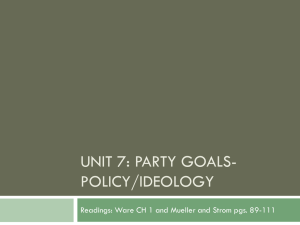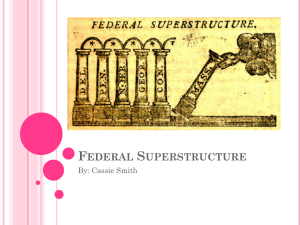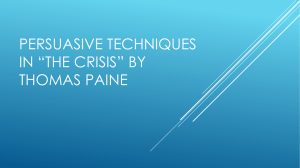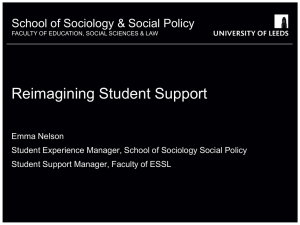DSE Event 7 Oct - Mitigation
advertisement
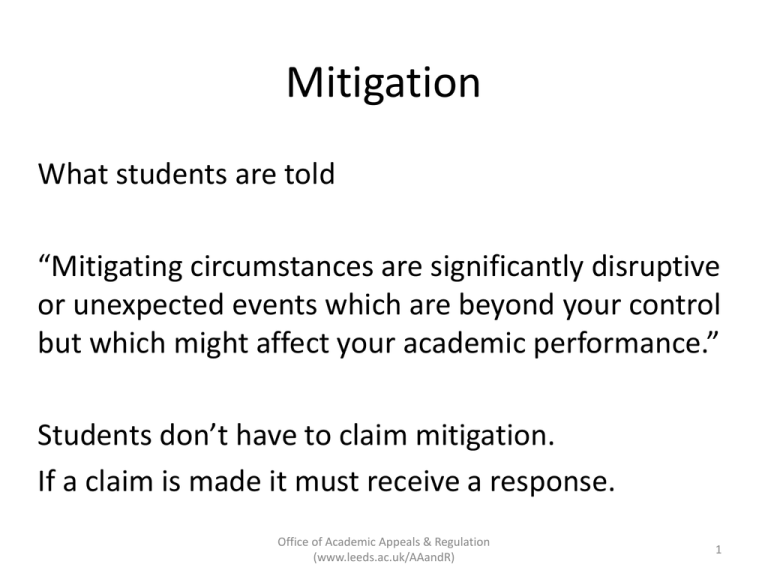
Mitigation What students are told “Mitigating circumstances are significantly disruptive or unexpected events which are beyond your control but which might affect your academic performance.” Students don’t have to claim mitigation. If a claim is made it must receive a response. Office of Academic Appeals & Regulation (www.leeds.ac.uk/AAandR) 1 Mitigation • Published examples of the effects of mitigation – Missing more than one week of classes – Missing coursework deadlines – Missing a test or University Examination – Being prevented from preparing for classes or exams – Impaired focus and concentration levels Office of Academic Appeals & Regulation (www.leeds.ac.uk/AAandR) 2 Mitigation • Published examples of events – Suffering a serious illness or injury – The death or critical illness of a close family member – Significant family crisis leading to acute stress – Absence arising from such things as Jury Service or Maternity, Paternity or Adoption Leave Office of Academic Appeals & Regulation (www.leeds.ac.uk/AAandR) 3 Mitigation • Five Categories 1. Illness 2. Personal – family disruption, death or illness of a relative 3. Financial – need to take paid employment 4. Accommodation 5. Course disruption, VLE issues, admin difficulties Office of Academic Appeals & Regulation (www.leeds.ac.uk/AAandR) 4 Mitigation • Published examples not normally considered grounds for mitigation – Holidays or other planned events that could have been anticipated – Assessments scheduled close together – Misreading the Exam timetable or misunderstanding assessment requirements – Inadequate planning or time management – Failure, loss or theft of computer or similar – Consequences of paid employment – Exam stress or panic attacks not supported by medical evidence – Minor disruption in an examination – Minor everyday matters Office of Academic Appeals & Regulation (www.leeds.ac.uk/AAandR) 5 Mitigation • Concatenation of events – Troubles rarely come as single spies...... • ‘Concatenation’ is a regular feature of appeals • Difficult to eliminate formally or informally from a case events that would not normally in themselves warrant consideration • Need to consider the case as a whole Office of Academic Appeals & Regulation (www.leeds.ac.uk/AAandR) 6 Mitigation • Evidence – What is required? – What is acceptable? – What don’t we ask? Office of Academic Appeals & Regulation (www.leeds.ac.uk/AAandR) 7 Mitigation • Illness – Medical Information • Acceptable: diagnosis, prognosis, a measure of the effect and certificate from a qualified medical practitioner (advice may need to be sought occasionally) - Forgeries and tampering with certificates surprisingly common. Concerns must be reported to the Office immediately • Not Acceptable: report of student’s own assessment, certificate from non-medic, herbalist, alternative medic, faith healer, clairvoyant Office of Academic Appeals & Regulation (www.leeds.ac.uk/AAandR) 8 Mitigation • Personal – Accept student’s word • But abuse of trust is not ignored • Cultural awareness issues: weddings, religious holidays, prayer time – Don’t ask for medical certificates for relatives but sometimes supplied • unless cause for concern about veracity Office of Academic Appeals & Regulation (www.leeds.ac.uk/AAandR) 9 Mitigation • Financial – Initially accept student’s word but evidence often supplied • Accommodation – Initially, again accept student’s word but evidence would be required if there were doubt Office of Academic Appeals & Regulation (www.leeds.ac.uk/AAandR) 10 Mitigation • Course disruption – Usually known to department – VLE and related issues recorded automatically – Exam disruption (fire alarms, snow etc) – Year Abroad Office of Academic Appeals & Regulation (www.leeds.ac.uk/AAandR) 11 Mitigation • Short-term and long-term Illness/Adversity – Short-term • Affects specific modules at specific time – Comparison with ‘normal’ performance straightforward – Long-term • Difficult to measure underperformance without a comparator • Issue of disability and ‘reasonable adjustment’ – Change methods of assessment but not remove requirement – Once reasonable adjustment has been made normal action is taken for any further mitigation NB. No double counting Office of Academic Appeals & Regulation (www.leeds.ac.uk/AAandR) 12 Mitigation • The effects of mitigation – Finalists • Special discretion: proximity to the classification boundary not relevant – Scale of adjustment at absolute discretion of Board • Aegrotat – Non-Finalists (and where applicable to Finalists) • First Attempts • Waive late penalty or permit extension • Repeat Year (extreme cases only) – seek advice Office of Academic Appeals & Regulation (www.leeds.ac.uk/AAandR) 13 Mitigation • The effects of mitigation for other assessments – Mitigation claimed for one assessment may well have affected others – even if not claimed – If concession is given for the claimed assessment consideration must be given to the likely effects on other assessments and action taken – students can’t pick and choose – Decisions can have uncomfortable consequences for the student but holistic view must be taken Office of Academic Appeals & Regulation (www.leeds.ac.uk/AAandR) 14 Mitigation • Decisions – Solely the responsibility of the School/Board of Examiners – Do not offer the student a choice, although consultation may be necessary/advisable – A poor decision cannot be defended by claiming it was the student’s choice Office of Academic Appeals & Regulation (www.leeds.ac.uk/AAandR) 15 Mitigation • Repeat Years as first attempts – Only to be offered in extreme cases – Justification; student has not been able to benefit from the tuition – Fee implications for the School/Department Office of Academic Appeals & Regulation (www.leeds.ac.uk/AAandR) 16 Mitigation • Enforced Temporary Withdrawal – Procedure available at University level – Only used in extreme cases Office of Academic Appeals & Regulation (www.leeds.ac.uk/AAandR) 17 Mitigation • Who has Responsibility for Decisions? Boards of Examiners Special Circumstances Committees School/Departmental University • Not the circumstances themselves that are being judged but the effects of the circumstances on the student’s academic performance or capacity to do the work Office of Academic Appeals & Regulation (www.leeds.ac.uk/AAandR) 18 Mitigation Five underlying principles for a decision 1. Illness – requires certification - NB fitness to return certificate required as well 2. Submission prior to Examination Board Meeting – no retrospection 3. No mark changes 4. Possible adjustment of Classification or modification of rules of progression 5. Allowance for academic underperformance but not criminality - Mitigation for plagiarism etc not comparable with mitigation for underperformance Office of Academic Appeals & Regulation (www.leeds.ac.uk/AAandR) 19 Mitigation • School Special Circumstances Committee • To consider the details of exceptionally sensitive student cases where the facts of the mitigation are such that to release them to the full School Board of Examiners would be inappropriate. • The conclusions and recommendations of the SSCC (but not the details of the case) are relayed to the full Board of Examiners where the final decisions are taken. • To consider and determine for and on behalf of the School Board of Examiners cases that fall ‘out of season’ where it is important that decisions on progression or related matters are made at an early stage in the interests of the candidate. – The SSCC will report its decisions to the School Board of Examiners at the earliest opportunity. – NB final decision rests with the Board. Office of Academic Appeals & Regulation (www.leeds.ac.uk/AAandR) 20 Mitigation • School Special Circumstances Committee • It is not open to the SSCC to award degrees or other qualifications. • If desired by the Board of Examiners, to give initial consideration to cases in advance of the Board meeting and so assist with the flow of business. – This could ensure inter alia that all students presenting with mitigating circumstances are considered fairly, consistently and equitably, and where appropriate that circumstances relevant to any part of a student’s career are taken into account • It is important that all requests for mitigation, including those that are less serious, are minuted and reported to the Board. Office of Academic Appeals & Regulation (www.leeds.ac.uk/AAandR) 21 Mitigation • School Special Circumstances Committee – Essential Points 1. Avoid considering cases that should go to the Board 2. Avoid taking decisions that are the responsibility of the Board 3. Consider only cases that are both sensitive and serious (and out of season) where it is essential that they are addressed privately because of the circumstances Office of Academic Appeals & Regulation (www.leeds.ac.uk/AAandR) 22 Mitigation • Considering cases anonymously – Can be done but no defence if case is not considered properly – A policy of anonymous consideration is no defence against inadequate consideration – Candidate still entitled to the minute under DSA Office of Academic Appeals & Regulation (www.leeds.ac.uk/AAandR) 23 Mitigation • University Special Cases Committee (USCC) • Where the circumstances are unclear or uncertain and the School Board of Examiners, nonetheless, wishes the effects of the regulations to be moderated, a case should be made by the Board to the USCC. • NB. It is expected that there will be very few cases in this category. It is likely that the majority of cases where the circumstances are unclear or uncertain will be rejected by the School Board of Examiners. • Where progression is desired by the School Board of Examiners but debarred because of lack of credit or because of failure in a compulsory or pre-requisite module (i.e. programme rules). • Where the School Board of Examiners decides that any regulations, either programme or University, appear to fall unfairly or unduly harshly in an individual case. • NB. Pending the outcome of the case for the points above, the student may progress only in accordance with the published regulations. • A mark or a decision of the School Board of Examiners that has been published needs to be changed. (Here advice should be sought immediately from the Office*.) Office of Academic Appeals & Regulation (www.leeds.ac.uk/AAandR) 24 Mitigation • Points to remember 1. Student must do the work • Professional/Course requirement – Compulsory module – Requirement for progression – Credit requirement • Confident that the student should graduate 2. Marks cannot be changed 3. Boards of Examiners take responsibility Office of Academic Appeals & Regulation (www.leeds.ac.uk/AAandR) 25
